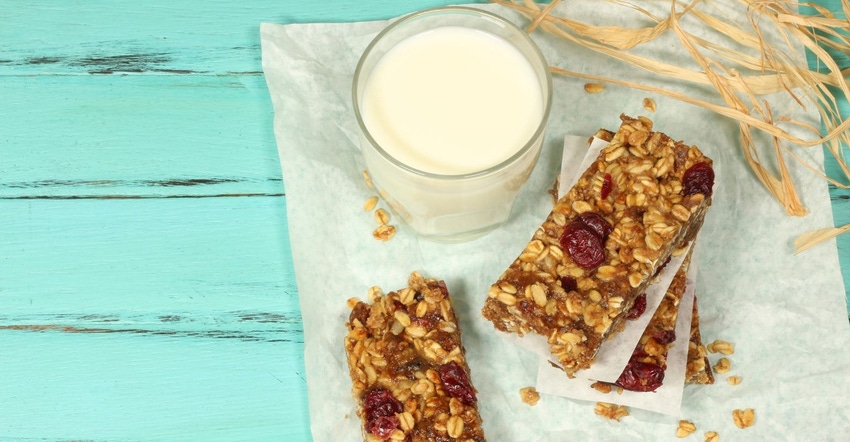As consumer fiber intake tends to fall short, a range of healthy ingredients can boost fiber content and positioning of breakfast, bar and snack applications.

Around the globe, modern diets may vary, but they unfortunately often have one commonality—a dearth of fiber. In adults, the recommended amounts of dietary fiber range from 25 g/d to 38 g/d, averaging around 30 g/d to promote adequate laxation and help prevent certain adverse health issues.
However, EU estimates suggest fiber intake is significantly lower, generally in the 20 g/d range, depending on the country. The European Food Safety Authority (EFSA) laid out regulations for nutrition claims made on foods, which allows brands to promote products for fiber intake:
• Source of fiber: A claim that a food is a source of fiber may only be made where the product contains at least 3 g of fiber per 100 g or at least 1.5 g of fiber per 100 kcal.
• High fiber: A claim that a food is high in fiber may only be made where the product contains at least 6 g of fiber per 100 g or at least 3 g of fiber per 100 kcal.
With or without the labels, great potential exists for companies looking to deliver delicious, high-fiber offerings to consumers, and in the forms and categories they seek.
CBI recently reported on the opportunity for healthy snacks in Europe. The firm noted whole-grain wheat and other cereals are quite popular, but opportunities are available for other varieties of ingredients such as pulse flours, seeds and natural grains. “Excluding nuts, more than half of the snacks consumed in Europe are biscuits and the second-favored snack are cereal bars. To improve the perceived healthiness of wheat products, common wheat sometimes gets replaced by whole grain or gluten-free grains and other ingredients are added, including high-fiber oats, ancient grains or seeds, such as quinoa, amaranth, spelt and chia.”
According to CBI, countries in the Northwest of Europe have the greatest consumption of processed healthy snacks. The U.K. is the largest European market for health and wellness snacks, particularly those with a focus on convenience. Organic is a key differentiator in the healthy snack market in the Nordic countries, Germany and France.
The market manifestations are many. For example, healthy snacking encompasses not only fiber intake, but also plant power. Consider Love, Corn, which takes old-school Corn Nuts to a healthier place. Founded in 2016, the founders received a major boost from a U.K. Virgin StartUp loan in 2017 and made a big move into the U.S. last year. Based in the U.K., the company produces crunchy corn in a variety of savory and sweet flavors. Notable is Love’s three-year goal of donating 1 million samples, building 50 school learning gardens and supporting local communities.
Moving from corn to legumes, both BRAVE and the Happy Snack Co. focus on crunchy roasted chickpeas and beans. Targeting the nut snacking category, these products are high in protein and fiber and lower in fat than nut-based competitors. Happy Snack now offers Roasted Chickpeas covered in dairy-free chocolate, while BRAVE Roasted Chickpeas come in a new Chocolate and Salted Caramel variety.
Breakfast is also seeing great movement in fiber. Consider how Weetabix—founded in 1932—is not only positioning its traditional biscuit as “the original superfood,” but now offers flavored, oat-based and even fiber-rich breakfast drinks with a protein boost.
Fuel is a U.K. brand with a focus on protein-rich breakfast offerings—think granola, porridge and oat fiber drinks—as well as unique “Muffin Pots” for consumers to add water, microwave and enjoy a fresh “muffin.” However, its newest launch is into the bar category, with high-fiber oat bars in banana, peanut butter, chocolate and super berry flavors.
Bars, in fact, offer the opportunity to span the breakfast and snack category; CBI reported in the U.K., the market share of smaller brands in the snack bar segment is 60%. But the big players are making active moves, including Mondelēz’s acquisition of Grenade, a U.K. performance nutrition company focused on the high-protein bar market. The move expanded the company beyond its Cadbury brunch bar (more indulgent and fiber-positioned) with Peanut, Raisin or Chocolate Chip flavors. The company also announced plans to develop more offerings for Europe and Asia in the better-for-you snacking and breakfast categories.
More unique positioning is offered by GOOD GOOD, which in September 2020 launched its Krunchy Keto bars with flavors like Raspberry Cheesecake and Salty Caramel Nut. Keto isn’t often thought of as a “high fiber” option, but these bars have 2 g net carbs, and as much as 6 g of fiber.
To read additional articles on the fiber space, visit the “Gut check: Fiber fuels innovation” digital magazine.
Heather Granato is vice president of content for health and nutrition at Informa Markets.
About the Author(s)
You May Also Like






